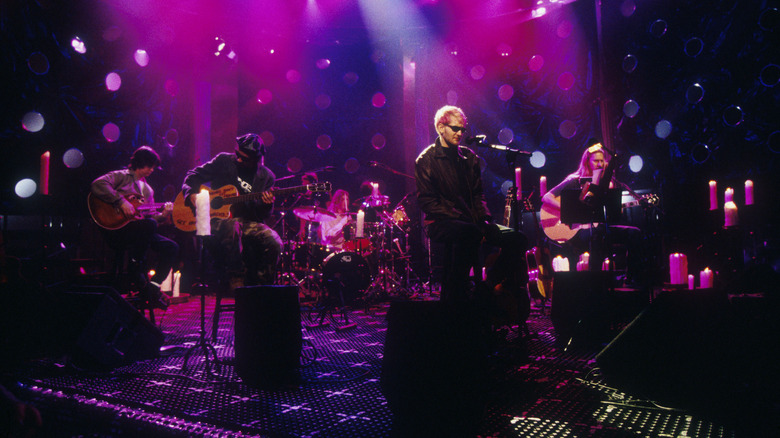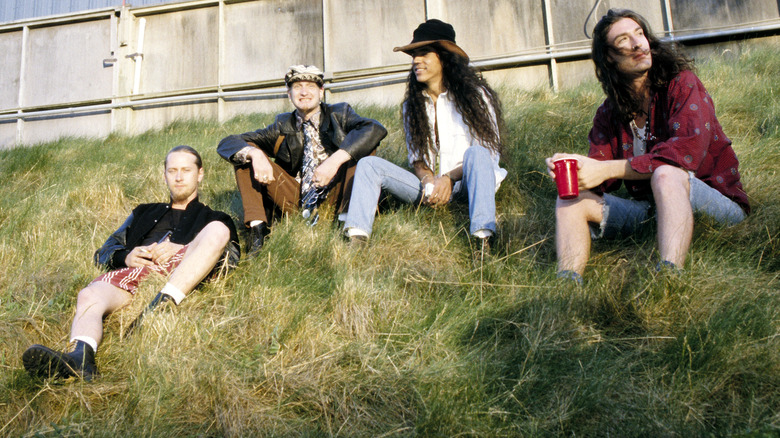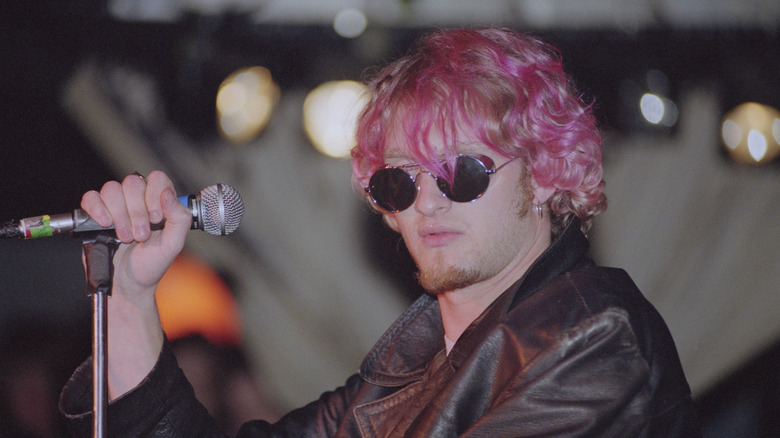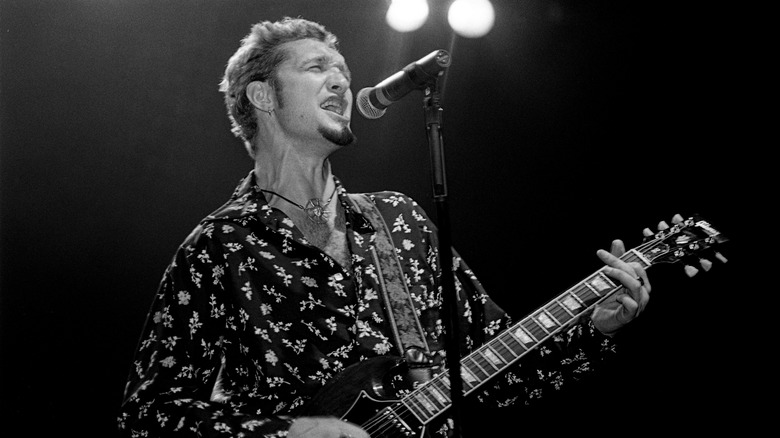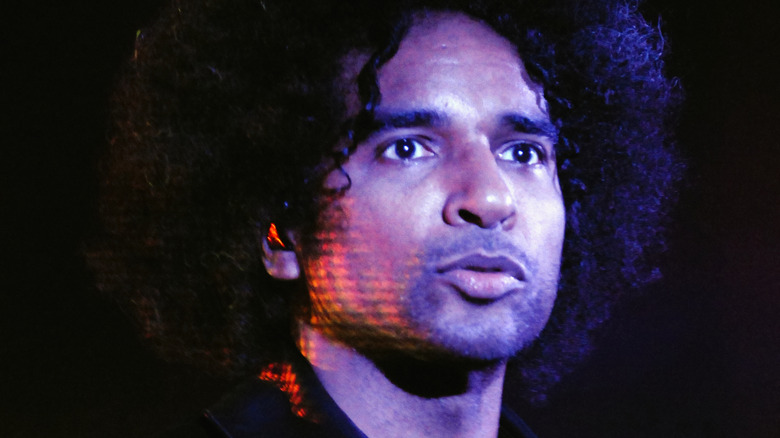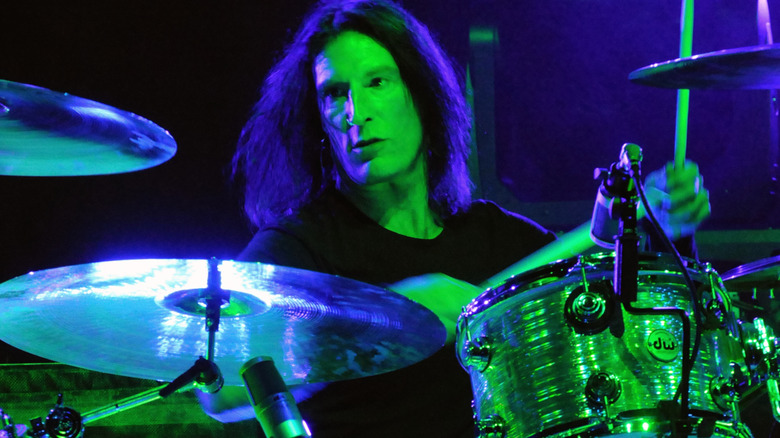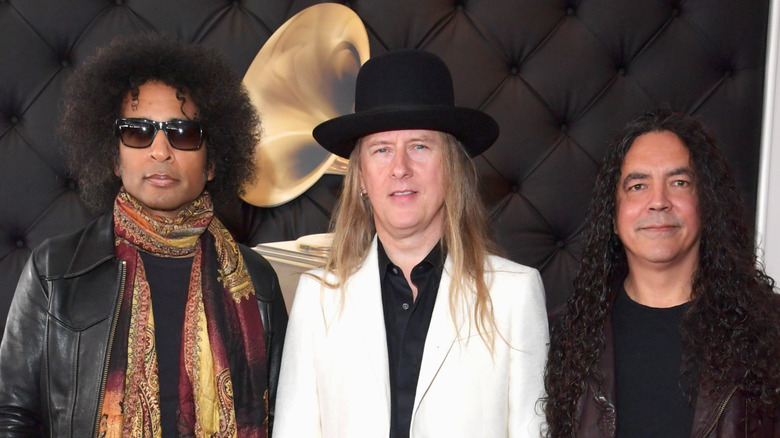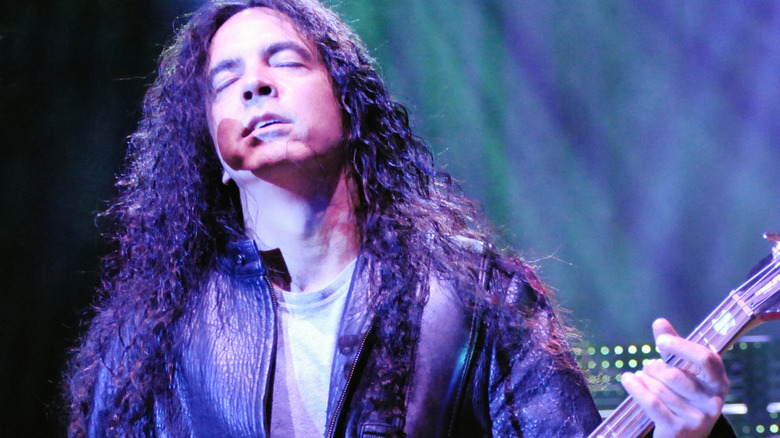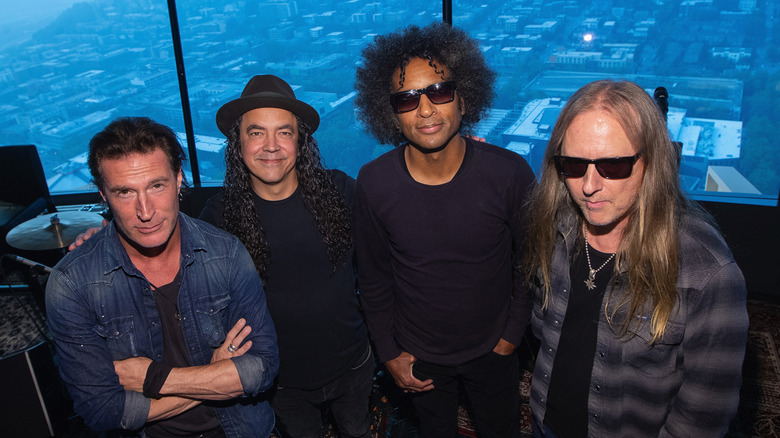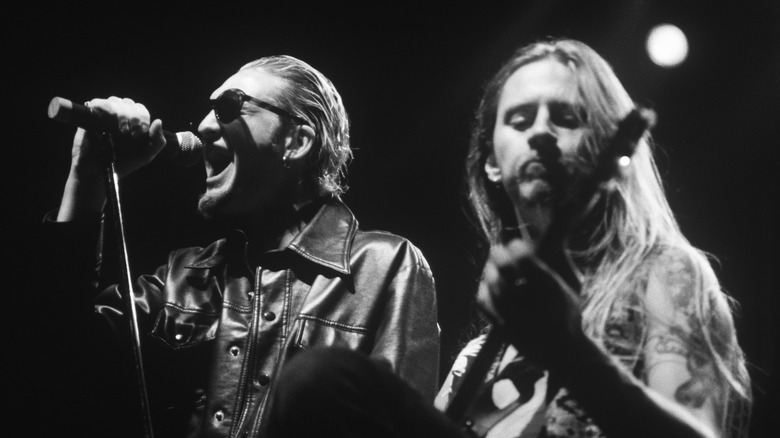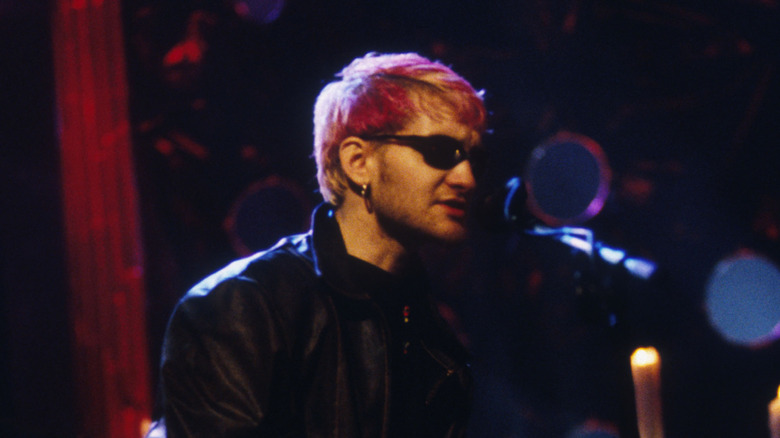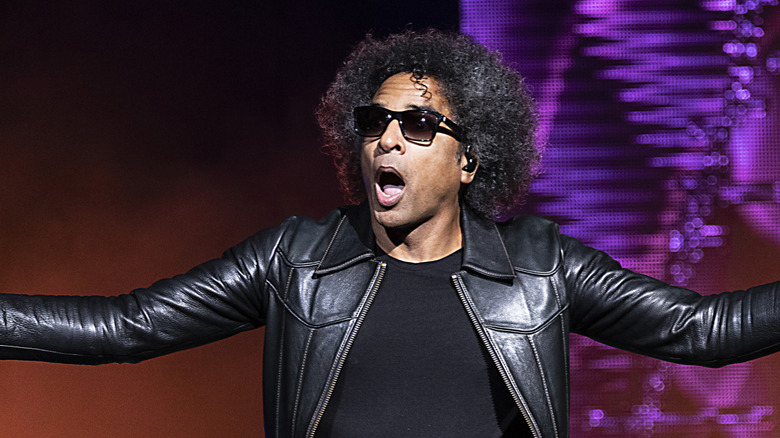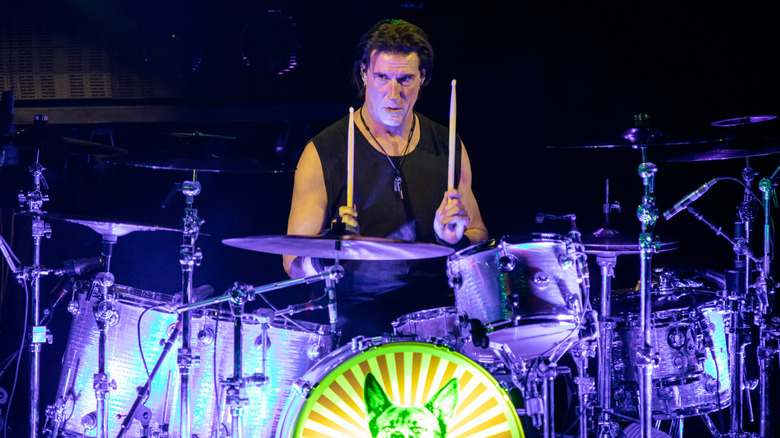The Untold Truth Of Alice In Chains
As a band, Alice in Chains deserves credit for straying away from conventions and establishing its unique identity in a competitive industry. Metal was hugely inspiring and helped build the foundation of its music, and the band became a heavyweight in the 1990s.
Alice in Chains were a part of the Seattle music scene, playing live gigs in the Pacific Northwest until it got the opportunity to create a demo and sign with Columbia Records. The label was intrigued by the band and lent its support wholeheartedly, something that helped it get noticed pretty quickly. But while the band did pretty well for itself publicly, behind the scenes, its members tried to deal with differences within the group.
As Alice in Chains gained popularity and carved a niche, the band was dealing with a bunch of tragic issues, including addiction, a period of separation and uncertainty, and new band members. The journey hasn't been straightforward, but the band remains active even today and is respected for its invaluable contribution to the industry. This is the untold truth of Alice in Chains.
Alice in Chains took some time to figure themselves out
Alice in Chains was the result of a few other projects, and it took the band some time to figure out its act. Its story started with a band called Sleze, which later became known as Alice N' Chains. That group was founded by Layne Staley, who then came across future Alice in Chains bandmate Jerry Cantrell. The two hit it off, and, after Alice N' Chains and Cantrell's own band dissolved, Cantrell started another band with Mike Starr and Sean Kinney, while Staley was working with a funk band.
Cantrell and Staley struck a deal: they'd perform in each other's bands and play fair. However, the funk group didn't last, and Staley became a permanent member of the other band, which they named Alice in Chains. The band's popularity was well earned and its members worked really hard to establish themselves in the industry. Speaking to Rolling Stone, Cantrell expressed how he was proud of their work and was also aware of the fact that their style was "a little more brooding and introspective." The musician added, "Some stuff grabs you right away; ours is really an acquired taste. It takes a few deep bites to get what it's all about."
Lead vocalist Layne Staley had a unique voice
Alice in Chains frontman Layne Staley was a sensational performer who knew exactly how to captivate his audience and come up with unique sounds. He was in the same league as fellow grunge-scene frontmen Kurt Cobain, Chris Cornell, and Eddie Vedder. But what made Staley stand out was his voice, something that was both vulnerable and powerful at the same time.
Musician Sully Erna of Godsmack once commented that he was inspired to sing thanks to Staley. Erna said, "He was single-handedly the guy that got me to start singing ... his vocal style in general was so different from anything that anyone was writing that it was so appealing and attractive that you couldn't help but be influenced by it." (via the Atlantic)
Also, Staley's natural talent was obvious by the fact that he wouldn't hesitate to improvise and try new things while recording a song. The fact that he was original was his greatest strength. Guitarist Johnny Bacolas, who worked with the singer in his early days remarked, "Layne had his own thing, and I think that's what was the most appealing about him. He had a very distinctive voice."
Layne Staley met a tragic end
Layne Staley had a lot going for him: he was talented and was making an impact in the music industry with his talent. Unfortunately, there was one issue he could never quite overcome: drug addiction.
Staley was found dead in his Seattle apartment on April 5, 2002. Investigators concluded that he died of an accidental overdose. In the late 1990s, Staley suffered a major blow when he lost his fiancée, Demri Lara Parrott, whose death was also linked to an overdose.
The singer was heartbroken and didn't take great care of himself as a result. It's believed that he spent a huge chunk of his final years by himself, and even stopped consuming regular food, mostly relying on supplements. He even ended up with gangrene at some point. Staley seemed to know what was coming for him. He told writer Adriana Rubio, "I know I'm near death... I did crack and heroin for years. I never wanted to end my life this way. I know I have no chance. It's too late. I never wanted [the public's] thumbs' up about this f****** drug use." (via Far Out Magazine).
If you or anyone you know needs help with addiction issues, help is available. Visit the Substance Abuse and Mental Health Services Administration website or contact SAMHSA's National Helpline at 1-800-662-HELP (4357).
Alice in Chains continued after Layne Staley's demise
Layne Staley's demise was a huge blow for his friends and former bandmates, but for several years before the lead singer's death, Alice in Chains had been on hiatus and the bandmates were estranged. At the time of Staley's death, neither Alice in Chains drummer Sean Kinney nor guitarist Jerry Cantrell had spoken to the singer for more than two years.
However, Alice in Chains made a comeback in 2006, with William DuVall taking Staley's place. Their first recorded album, however, was only released in 2009 and was called "Black Gives Way to Blue." Cantrell felt reasonably confident about Alice in Chains at this point, telling Vice, "We weren't nervous because we felt the same way we felt every time we put a record out. We knew it was good. We were continuing on. We were reinventing ourselves. Those are all elements of everybody's life."
He added that they definitely didn't want to give up, and were thankful for the new iteration being mostly embraced by their fans. However, this was something that happened gradually. In the days following Staley's death, the band was too shaken up and didn't feel like performing. They considered doing something private as a tribute to Staley, but things were uncertain and broken until 2005, when the band got together to play at a benefit concert for victims of the previous year's major tsunami. Cantrell said, "...that was a really heavy night to stand up there without Layne and play those tunes. It was fu***** heartbreaking. But it was also very triumphant and cathartic."
New frontman William DuVall received a lot of support
Most fans were happy to see Alice in Chains back in action after their long break from the industry. For new singer William DuVall, being a part of the band was a huge responsibility, but he was encouraged by Staley's family to perform. Layne Staley's dad, Phil, said (via Loudwire), "William has done a wonderful job and I couldn't be prouder that the group is still carrying on. I love all those guys, love them ... we are family."
DuVall was incredibly touched by the support he received. He was also grateful for the fact that fans welcomed him in their own way. He recalled singing with the audience members at a concert and said, "That's such an unbelievably beautiful feeling ... All you can do in the moment is kind of be in the moment, so you're not really thinking about how profound this is." The singer told Kerrang! that "Layne was doing the same thing that all of us try to do as songwriters: you're trying to tell your truth, and hopefully it strikes a chord with somebody else... it really transcends space and time. And death."
Jerry Cantrell has released solo albums
Guitarist Jerry Cantrell decided to start recording music alone when Alice in Chains was relatively inactive as a band. He explained to Kerrang!, "The two [solo] records I was able to make at the turn of the century, to quote the Bee Gees, were in a period when [Alice In Chains] weren't doing a lot as a band, so I had the opportunity."
Cantrell explained that he likes to sit with ideas for extended periods before he turns them into songs. He added that he could guess fairly accurately what his listeners would think about the songs. He said, "I've been lucky enough to have an ear for when [a piece of music] is important or really good. If it strikes me that way, I can infer from experience that if it's hitting me that way it'll probably hit a few other people that way too."
Dirt was influenced by the LA riots
Most die-hard fans of Alice in Chains will be able to talk at length about one album in particular: "Dirt." The album resonated with listeners pretty quickly and was a massive hit, despite the fact that it was intense in more ways than one. The songs were recorded during a difficult period: the 1992 riots in Los Angeles.
Guitarist Jerry Cantrell once remarked that it was hard to ignore what was happening outside while they were creating the album. He recalled, "I was actually in a store buying some beer when some guy came in and started looting the place. I also got stuck in traffic and saw people pulling other people out of their cars and beating the crap out of them." He added that it was a pretty scary experience and that it "definitely affected the overall feel of the album."
Alice in Chains was passionate about the grunge scene
Alice in Chains introduced new sounds to the public, and its members were not afraid to take risks with their music. They brought a combination of metal, hard-hitting lyrics, strong vocals, and unforgettable tunes. In a matter of five years, the band had their listeners hooked: they managed to work on three albums and had released hit singles. Somewhere along the way, they even experimented with acoustic music. Jerry Cantrell told Vice, "Just artistically to be able to widen the field that you're able to operate in so early in our career was very important."
Before grunge became a genre that was recognized by the mainstream, Alice in Chains was starting a movement of their own with like-minded musicians. Cantrell explained that the collective energy in 1990s Seattle was hard to ignore. He said, "What was happening in our hometown — it was already special to us and we could already feel the energy — and it was starting to kinda spill out across the country." At some point, they could feel that they were in sync with those who were trying something similar. As Cantrell said, "You started to feel a buzz about it and it was like, 'S***, I think we might be doing the right thing here; this is kinda cool.'"
Jar of Flies has an interesting backstory
Some Alice in Chains songs were inspired from the most unlikely things and events from the band members' lives. One of the strongest examples is the album "Jar of Flies." In an interview with Hit Parader, Layne Staley explained the title. "It came from a science experiment Jerry Cantrell did when he was in the third grade," he said.
This is how things went down: Cantrell basically had two jars of flies. While one of them contained insects that had an abundance of food to feast on, the other jar had flies that were surviving on very little and were malnourished. Somehow, the jar with the flies that were being overfed was the one with the tragic ending: all the flies perished because of overpopulation. Meanwhile, the underfed flies stayed resilient and survived for an extended period. Staley said, "I guess there's a message in there somewhere. Evidently that experiment had a big impact on Jerry."
Alice in Chains bassist Mike Starr died in 2011
In 2011, Alice in Chains' former bassist and founding member Mike Starr died at 44 years old. Starr had dealt with substance misuse for years, and had left the band after the release of "Dirt": he later said he was asked to leave because of his addiction issues.
While Starr mostly kept a low profile after Alice in Chains, he did participate in a reality show on VH1 called "Celebrity Rehab." He wasn't entirely comfortable with the cameras during the show, and was heard saying (via Vulture), "I mean, I'm sound asleep, I wake up, and there's a f****** camera on me. What the f*** is that?"
Starr got into trouble with the police weeks before he died for possessing unauthorized prescription pills and for having an outstanding warrant that was related to drugs. Starr had spoken about being disturbed by Layne Staley's demise and was under the impression that he was the last person to see the singer before he died.
If you or anyone you know needs help with addiction issues, help is available. Visit the Substance Abuse and Mental Health Services Administration website or contact SAMHSA's National Helpline at 1-800-662-HELP (4357).
Jerry Cantrell has also had to deal with mental health challenges
Jerry Cantrell may come across as being level-headed, but he is not invulnerable. According to Kerrang!, when Alice in Chains got a chance to perform on "MTV Unplugged" in 1996, the band members knew that this could be a great opportunity to showcase their talent to the world. Cantrell said, "Boiling it down reveals the heart of the song, without all the bells and whistles, and if it still hits in that environment then you did good."
But Cantrell couldn't help but feel overwhelmed as they got closer to the performance, starting to feel really unwell. Cantrell later said that it was a combination of the mental, physical, and emotional challenges that came with being a part of a band. Performing gave him some respite from his troubles. He said, "When the lights went green, the cameras started rolling, my body gave me some adrenaline and dopamine I needed to get through it."
If you or someone you know needs help with mental health, please contact the Crisis Text Line by texting HOME to 741741, call the National Alliance on Mental Illness helpline at 1-800-950-NAMI (6264), or visit the National Institute of Mental Health website.
Alice in Chains is dark, but with a sense of humor
There's no denying that listening to Alice in Chains can often be a hard-hitting and super intense experience. But that doesn't mean that its band members can't laugh at themselves. Bassist Mike Inez told Loudwire that they simply use music as an outlet to express their feelings. He said, "We're just blessed by music and so grateful for everything, especially the fans. We couldn't do these albums and tours if nobody wanted to listen to us."
The article noted that Inez and his bandmates don't come across as intense in real life and are actually fairly light-hearted. Inez didn't contest that point. A Rolling Stone review also points out that the band's sense of humor can even be found in some of their songs, giving the example of the "ultracatchy" song, "God Am," which it describes as featuring "playfully sacrilegious double-entendre."
Jerry Cantrell values his privacy
In a world that's often hooked to social media, the members of Alice in Chains prefer to take a slightly different approach. According to Jerry Cantrell, they don't like being too active on social media. When he was asked to voice his opinions on musicians being too involved online, Cantrell told Vice, "I don't want any part of it. I think we all do a lot better to know there's no putting the genie back in the bottle so I'll just stay out of it. I don't have a Facebook account, I don't tweet."
The band is kind of old school and likes to maintain a certain air of mystery. Cantrell added that he understands that their attitude doesn't work for the many other musicians who prefer using social media to connect with their fans. He said, "I'm not gonna say it doesn't work for someone else ... obviously a lot of people on the planet are f****** involved with it so that's just my particular take on it."
Layne Staley encouraged Jerry Cantrell to sing
As the Alice in Chains lineup solidified, Layne Staley took on the role of lead singer and Jerry Cantrell focused on guitar. Cantrell had extensive vocal experience — choir and a cappella as a teenager — but he was too nervous to sing in the band. Staley provided the push. "Layne was really responsible for giving me the confidence to become more of a singer. He'd say, 'You wrote this song, this means something to you, sing it,'" Cantrell recalled to Guitar World in 2009. "He kicked my a** out of the nest." During Alice in Chains' dormant periods, Cantrell launched a solo career, and from the mid-2000s on, he's the band's co-lead vocalist.
In a parallel story, Staley needed the approval of another high-level musician to do more than just sing for Alice in Chains. "He wanted to play guitar more, and he was kind of intimidated because he didn't play that much guitar, but he really was turned on by how you played guitar," Cantrell told Staley's inspiration, Tom Morello of Rage Against the Machine, on the musician's podcast "Maximum Firepower" (via Loudwire). "He wanted to play guitar more, and he was kind of intimidated because he didn't play that much guitar, but he really was turned on by how you played guitar."
Staley went on to create some of Alice in Chains' best-known riffs, including the ones that drove "Angry Chair," "Hate to Feel," and "Head Creeps."
Some ill-fated shows pretty much spelled the end of Alice in Chains
While Alice in Chains released a self-titled album in 1995, it didn't tour behind it. It was something of a strategic comeback when Alice in Chains re-emerged in 1996, planning to hit the road as the opening act for Kiss and replacing the previously booked Stone Temple Pilots, which dropped out when singer Scott Weiland checked into a drug rehab program. As a lead-up to its first real slate of concerts in three years, Alice in Chains taped an episode of the acclaimed concert series "MTV Unplugged," where it played primarily acoustic versions of its heavy rock in a small performance space.
The made-for-TV concert seemed to unfold nicely, but at a 2018 concert, guitarist Jerry Cantrell told fans that it only seemed that way thanks to the magic of retakes and editing. "Funny story, we did the 'Unplugged' in New York and Layne kept f***ing up 'Sludge Factory,'" Cantrell said (via Alternative Nation). "We did it like eight times, he blew the same thing in the second verse."
Staley never did get it right; he audibly mumbles some frustrated profanity in the televised performance. After "Unplugged," Alice in Chains warmed up Kiss audiences in Detroit, Louisville, and Kansas City. Alice in Chains then bowed out as Staley had overdosed on drugs and required hospitalization. That concert in Kansas City would be the last time Alice in Chains performed with Staley on lead vocals.
A lack of Heart secured William DuVall's position in Alice in Chains
Alice in Chains persisted with Layne Staley at the helm from 1987 until his death in 2002. It took four years for the surviving members to consider regrouping, and when they did, they hired Comes with the Fall vocalist William DuVall. He splits lead singer duties with long-serving guitarist Jerry Cantrell, and Duvall's tenure with the band has now exceeded that of Staley. However, the job could easily have gone to another and more high-profile singer. Scott Weiland of Stone Temple Pilots and Velvet Revolver petitioned Cantrell about letting him join Alice in Chains on a permanent basis after he sang with the group in a handful of mid-2000s concert appearances.
Cantrell first became close with DuVall when he toured with Comes with the Fall in 2002, and he asked the singer to participate in "Decades Rock Live," a VH1 concert honoring Heart. That band's singer, Ann Wilson, had invited Alice in Chains, and they were supposed to perform the latter's hit "Rooster" together. But when Wilson was a no-show for rehearsals, DuVall stood in and impressed Alice in Chains and Wilson, who happily ceded the spot.
"That's what guaranteed me a spot in the television program," DuVall told Rock 98.9. "It really legitimized what was already in progress." Alice in Chains then staged a limited set of shows and considered adopting a new name, before ultimately officially reforming with DuVall as its frontman.
Alice in Chains canceled its 2025 tour
At the beginning of 2025, it looked like Alice in Chains could have a very busy year. Following a two-year period in which the band performed just once — guitarist Jerry Cantrell had taken some time to record a solo album and tour to promote it — Alice in Chains announced that it would be a part of multiple spring and summer rock festivals. The band was also planning to headline some gigs on its own at arenas and casinos, before wrapping it all up with a spot on the bill of Ozzy Osbourne's farewell Black Sabbath show.
On May 10, 2025, Alice in Chains revealed that almost all of its plans were no longer valid. During a pre-show equipment check at its May 8 concert at the Mohegan Sun Arena in Connecticut, the band's veteran and original drummer, Sean Kinney, sustained what the band called a "non-life-threatening medical emergency," according to its account on X. That show was immediately canceled, and then so was the rest of the tour when it became evident that Kinney wouldn't soon be up to the rigors of touring and playing.
"While we were all eager to return to the stage, Sean's health is our top priority at this moment," Alice in Chains said in a statement on its Instagram account. "Although this issue requires immediate attention, his long-term prognosis is positive."
